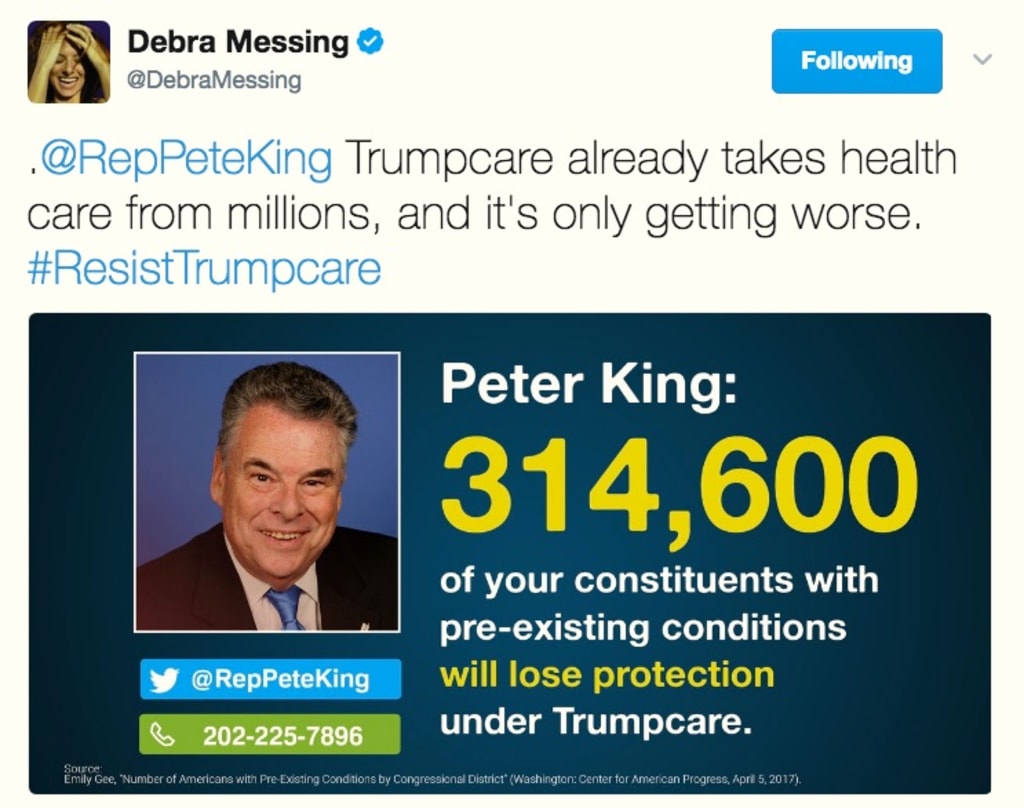Trump's ‘Rookie Error’ Revisited
This latest edition of a bad health-care idea mostly failed for two reasons: In town halls and on Twitter, a lot of people said it was a bad idea. And House Republicans listened.

Chuck Schumer asked the question about the health-care bill that no one at the White House asked. The New York Democratic senator put it rhetorically to The New York Times: “Why,” he asked, “would you risk voting yes for a bill that is devastating to your constituents and has no chance of becoming law?”
That plain-spoken common sense bore itself out on April 27th, as the Republican-led House of Representatives failed to come to agreement on the American Health Care Act, again not bringing it to the floor of the House for another vote that was destined to fail, like the original bill was predicted to do, on March 24th.
The bill, with some tweaks and variations, was expected to finally be one of the Trump administration’s campaign Promises Kept (that and the border wall). In fact, the AHCA has become more clearly to the public what it’s always been: a deeply cynical and poorly-conceived effort to repeal and replace Obamacare, one that, by some estimates, would have cost 24 million Americans their access to health insurance.
House Minority Leader Nancy Pelosi nailed it perfectly in March, describing the cause of the demolition of Trumpcare Bill #1 “Rookie error, Donald Trump, for bringing this up on a day that it is clearly not ready.”
That was March 24th. Fast forward a month and ain’t a damn thing changed — except the calendar. First time, Trump had his dome peeled back on day 63. This time, Trump got schooled on day 98.
◊ ◊ ◊
It’s been an article of faith for House Trump from before the beginning: The new president would repeal and replace Obamacare in the first 100 days of his administration. That was the talking point, the one parroted by Trump himself on the campaign trail for months.
But on Thursday, the bill went down to defeat again, partly in a way that’s almost counter-intuitive given the Republican advantage in the House. The Democrats, while in the numerical minority, found they had more power, or at least situational leverage, than their numbers would indicate.
From The Times: “Democratic leaders threatened to withhold votes from a stopgap spending measure to keep the government open past Friday if Republicans insisted on trying to jam the health care bill through the House on Friday or Saturday, which is Mr. Trump’s 100th day as president.”
◊ ◊ ◊
That (hollow) threat helped doom the bill. The Trump health-care measure also failed because of what it revealed — what it symbolized — about the things dividing the Republican party. When the bill was first defeated, the House Freedom Caucus was roundly blamed for holding back its support. According to some observers, the Freedom Caucus gained something close to the upper hand this time.
A compromise was thought to be near, but it didn’t pan out; what was changed to accommodate the Freedom Caucus made moderates unhappy. Never mind consensus across the aisle; the Republicans never achieved consensus within their own ranks — which is especially embarrassing since, with a majority Republican House, they didn’t need to reach across the aisle to get the bill through the House. They only had to agree with themselves.
But at the end of the day, neither dissension within the ranks nor exertion of leverage from the loyal opposition was even needed. This latest iteration of a bad health-care idea went down to defeat mostly for one reason: Everyday people told Republicans in Congress it was a bad idea. Lawmakers got the word from their constituents — the people they owe more to than the president-apparent — to leave their health care alone.
Members of Congress returning to their home districts got hammered by their constituents at town halls around the country, both before the first bill and the second. You could make the case that Trumpcare II was doomed on April 10, when Michigan GOP Rep. Justin Amash told a town-hall audience that Trumpcare would “put the sickest and most vulnerable at risk.”
Florida GOP Rep. Ileana Ros-Lehtinen got the message from her constituents, and said as much. “The proposed changes to this bill would leave too many of my constituents with pre-existing conditions paying more for health insurance coverage, and too many of them will even be left without any coverage at all,” she told The Times on Thursday.
◊ ◊ ◊
And ironically enough, House Trump lost this second consecutive health-care bill battle partly because of the furious populist reaction to the bill on Twitter, The Donald’s favorite bludgeoning tool.
Activists like actress Debra Messing and House of Cards creator-producer Beau Willimon camped out in the Twitterverse and stayed there to the end, railing against the bill and encouraging twittizens to do the same. “Trumpcare already takes health care from millions, and it’s only getting worse,” Messing tweeted repeatedly on Wednesday, using the same message in tweets to several Republican lawmakers.
MoveOn.org and the Courage Campaign weighed in with a flurry of emails to its longtime supporters; one from MoveOn highlighting the projected annual surcharges for those with certain serious medical conditions. Color of Change used the opportunity not just to skewer the Trump bill, but also to champion the need for single-payer health care, a Holy Grail for progressives.
The end result: a newly-energized Democratic House minority; an emotionally uplifted progressive community, empowered by examples of real-world grassroots activism (some of it on Trump's turf!); new hope for the single-payer system; new intention to use single-payer as a campaign issue in 2018; fresh hope for more of the political pragmatism of relative Republican moderates; and a Trump White House encountering what can’t be told, only learned — the hard way: You can’t always get what you want ... especially when your party doesn’t know what it wants.
About the Creator
Michael Eric Ross
Michael Eric Ross writes from Los Angeles on politics, race, pop culture, and other subjects. His writing has also appeared in TheWrap, Medium, PopMatters, The New York Times, Entertainment Weekly, msnbc.com, Salon, and other publications.






Comments
There are no comments for this story
Be the first to respond and start the conversation.